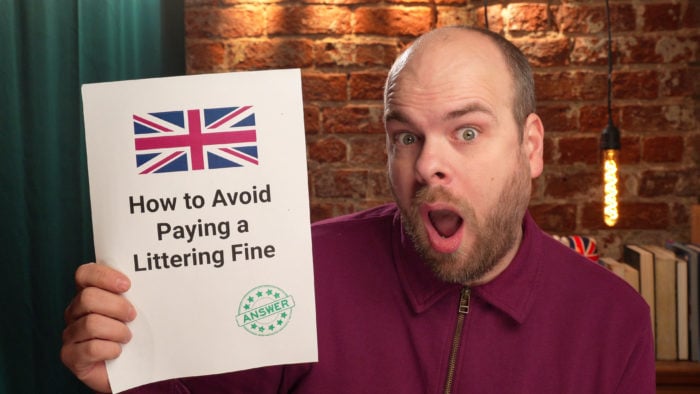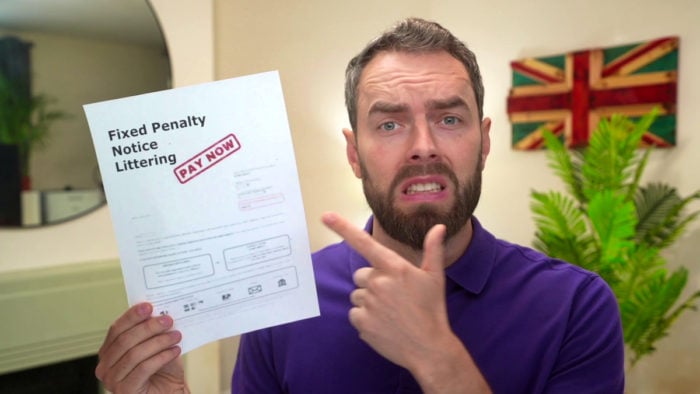Just received a littering fine and aren’t sure what to do next? We’re here to help. Every month, our website guides over 130,000 people through fines and penalty tickets. So, remember, you’re not alone in this.
In this article, we’ll provide clear and simple information on:
- What exactly a littering fine is.
- If you are required to pay these fines.
- How you can make an appeal against a littering fine.
- Tips to avoid getting fined for littering.
- What may happen if you choose not to pay the fine.
We understand that getting a littering fine can be worrying. You may be unsure about the rules, worried about the cost, or confused about the next steps. But you can rest easy now. Our aim is to give you helpful advice and show you options you may not know you have. Let’s walk through this together.
Most Appeals Succeed
In some circumstances, you might have a legitimate reason not to pay your littering fine.
It’s a bit sneaky, but the last time I needed legal advice, I paid £5 for a trial to chat with an online solicitor called JustAnswer.
Not only did I save £50 on solicitor feeds, I also won my case and didn’t have to pay my £271 fine.
Chat below to get started with JustAnswer
*Around 35,000 people dispute their tickets each year with the Traffic Penalty Tribunal, and a striking 64% of those appeals are successful, so it’s well worth a try.
Is dropping litter illegal in the UK?
Yes, dropping litter is illegal in the UK under the Environmental Protection Act 1990.
Anti-littering legislation UK is stringent but despite this, Keep Britain Tidy states that more than two million pieces of litter are dropped every day in the UK, costing the taxpayer more than £1 billion per year to clean our streets.
One way of tackling the problem is by issuing people with a littering fine.
Environmental Impact of littering UK
The effects of littering on the environment UK are consequential.
The Environment Secretary, Michael Gov, launched the campaign “Keep it, bin it”.
The campaign shows how wildlife is impacted by litter with the RSPCA receiving 10 calls a day about litter-related incidents involving animals.
Friends of the Earth and the Marine Conservation Society have all voiced their concerns for a long time on how dumping litter impacts the environment, wildlife and marine ecosystems.
What is a littering fine?
UK littering penalties are severe with fines being issued to a person who is alleged to have dropped litter in a public space.
Littering can include but isn’t limited to:
- Dropping empty wrappers and cartons
- Dropping food waste or chewing gum
- Not cleaning up your dog’s faeces
- Graffiti without permission
- Putting up posters without permission (known as fly-posting)
According to section 87 of the Environmental Protection Act 1990 (EPA), it is a criminal offence to throw down, dump, or otherwise deposit and leave litter in any location exposed to the air, including private land.
It includes both public and private property (as amended by the Clean Neighbourhoods and Environment Act 2005).
Throwing rubbish into bodies of water like rivers, streams, or lakes is also included.
The perpetrator may be given a fine by the police or by the local authorities. However, private citizens may also choose to pursue legal action.
The offence is brought before the magistrates’ court, which has the authority to impose a fine of up to £2,500.
It is exceedingly difficult to prosecute significant numbers of people who litter since the process of going to court for littering is time tedious and expensive.
It is possible to issue a fixed penalty notice for the offence of littering under Section 88 of the Environmental Protection Act (EPA).
Local authorities have the authority to choose the amount of the fine that will be imposed within their area.
But, if they do not, the fine is set at the normal default value of £75.
The offender has fourteen days to make the payment. The failure to pay may result in legal action being taken.
Fixed Penalty Notice for littering
The correct term for a littering fine is a Fixed Penalty Notice (FPN).
You can be issued a Fixed Penalty Notice for littering as well as other offences, such as speeding and other driving offences.
People can be given “on-the-spot fines UK”, or the FPN for littering could be sent to your home address.
In either case, you will be given 14 days to pay.
Littering best practices
There are many anti-littering campaigns around the country from cleaning beaches, rivers, parks, towns and rural areas.
Schools and communities are all encouraged to take part in cleaning areas all over the UK.
Waste bins are strategically placed to help you dispose of litter correctly. Recycle sites allow you to dispose of various types of waste safely.
Signs are erected in popular areas that encourage you to take litter home with you.
All of these strategies are in place to protect the environment and wildlife.
Are Fixed Penalty Notices serious?
A Fixed Penalty Notice can become serious if you ignore it.
Who can issue a fixed penalty notice for littering?
You might be wondering who enforces littering laws UK?
Fixed Penalty Notice littering fines are predominantly issued by local councils and national parks, but they can be issued by police officers and community support police officers as well.
Several different types of fines can be issued by the council or a police officer.
You can read about them and find information relevant to your fine on my police and council fines hub.
Successful Appeal Case Study
Situation
| Initial Fine | £100 |
| Additional Fees | £171 |
| Total Fine | £271 |
The Appeal Process
Scott used JustAnswer, online legal service to enhance his appeal. The trial of this cost him just £5.
| Total Fine | £271 |
| Cost of legal advice | £5 |
JustAnswer helped Scott craft the best appeal possible and he was able to win his case.
Scott’s fine was cancelled and he only paid £5 for the legal help.
In partnership with Just Answer.
Do I have to give my details to litter enforcement officers?
Yes, you must give your personal details to a litter enforcement officer.
Otherwise, you have violated the law as stated in the Environmental Protection Act of 1990.
You have also broken the law if you give false information to the officer.
If you persistently refuse to give your details to a council worker, the police might be called and there is a possibility that you will be arrested.
What happens if there are the wrong details on fixed penalty notice for littering?
This depends on whether or not you are guilty of littering. That said, disputing littering fines UK is often challenging.
If you have received an FPN through the post with the wrong details and you haven’t committed the crime, you should get in touch with your local council straight away.
However, if you did drop litter and have a fixed penalty notice with the wrong details, you should also endeavour to get this straightened out too.
Your FPN for littering should outline how to get in touch.
Even if you didn’t give the wrong details out when you were caught littering, you might still get into trouble.
Clearing up any mistakes as soon as possible may save you a hefty fine, or even being arrested.
How much can you be charged for littering?
Local authorities can issue littering fines of up to £150.
The amount you’re fined might be determined by the type of littering offence you’re alleged to have committed and the location of the alleged littering.
The default littering fine is usually £75.
If the offender is taken to court and prosecuted. The maximum littering fine UK could be as much as £2,500.
Join thousands of others who got legal help for a £5 trial
Getting the support of a Solicitor can take a huge weight off your mind.
Reviews shown are for JustAnswer.
Can I pick up my litter to avoid a littering fine?
Unfortunately not, a littering fine can be issued as soon as you’re seen dropping or leaving litter in a public space.
Even if you offer to pick up your litter, the Fixed Penalty Notice can still be issued against you.
Are littering fines legally enforceable?
Yes, Fixed Penalty Notices for littering are legally enforceable.
In fact, these “fines” are really a conditional offer for you to pay to avoid prosecution in court. If you fail to pay within the 14-day deadline, you may be summoned to court.
What happens if you don’t pay a litter fine?
If you don’t pay a littering fine you’ll receive a court summons and have to attend a court hearing.
If the court decides you’re guilty of littering, you can be asked to pay a much bigger fine of up to £2,500.
Although littering fines of this magnitude are reserved for unique cases, you’re still likely to be made to pay more if the case escalates to court.
If you do not pay the fine after it has gone through the courts, the courts can:
- Take the money directly from your wages or benefits.
- Send bailiffs to your address
- Add it to your credit file, making it harder to obtain credit in the future.
I suggest you try not to let things get this far because it could prove expensive.
Can I avoid paying a littering fine?
The foolproof way to avoid having to pay a littering fine is to not litter in the first place.
Unfortunately, there are minimal ways to get out of a fixed penalty notice for littering.
Some councils have a formal appeals process so you can appeal your fine and hopefully get it cancelled.
But there is no littering fine appeal process UK. You can, however, ‘dispute’ the fine although it tends to be challenging.
The only way to get out of a littering fine is to convince a judge that you didn’t litter, which can be extremely difficult.
How do I appeal a Fixed Penalty Notice for littering?
As it stands at the moment, there are no formal rounds of appeal against a fixed penalty notice for littering.
If you dispute a fixed penalty notice for littering, the case will be resolved through the legal process of formal prosecution before the courts.
You have 14 days to pay the notice before you will be prosecuted for the offence.
A summons will be issued against you if you do not admit that an offence has been committed or if you do not pay the FPN within the allotted time of 14 days.
At which point the case will be brought before the Magistrates’ Court for a hearing.
If you are found guilty, the courts may levy a fine of up to £2,500 against you and a criminal record may also be added to your permanent file.
What happens if I appeal a littering fine and lose?
If a formal appeals process is available for your littering fine and you subsequently lose the appeal, you’ll be given a new deadline to pay.
If you don’t pay by the deadline, you’ll receive a court summons and have to attend a court hearing.
At the court hearing, you will have an opportunity to tell the court why you never paid, possibly citing reasons you don’t think the littering fine was rightfully served.
However, if the judge disagrees they are likely to make you pay a bigger fine. I suggest you don’t let things go this far.
Do I have to pay a fine for dropping a cigarette?
Yes, dropping any part of a cigarette is considered littering and if seen can result in a Fixed Penalty Notice for dropping a cigarette (classed as littering) and a fine of up to £150.
The offence carries a potential penalty of up to £2,500 as well as a criminal record for non-payment if they are found guilty in a magistrates’ court.
Case study: Littering fine issued by mistake
I’ve included a message posted on a popular forum about a littering fine they received for dropping a cigarette and they don’t even smoke.

Source: Moneysavingexpert
Is dropping a cigarette butt down the drain classed as littering?
Yes. It doesn’t matter where cigarette butts are dropped, cigarette butts not disposed of correctly (in a bin or designated ashtray) are counted as litter.
It will be classed as such when it comes to issuing a Fixed Penalty Notice.
I should also point out that throwing a cigarette out of a vehicle is also a littering offence.
What is the Environmental Protection Act (1990)?
The Environmental Protection Act (1990) is an Act of Parliament to state how the UK should tackle waste management and emissions.
It is the relevant act for littering fines together with UK waste management laws.
How effective are littering fines?
According to data obtained through the Freedom of Information rules, most local authorities issue less than one littering fine a week.
One in six councils doesn’t issue any fines at all in twelve months.
That said, enforcement was found to vary widely across the country with only a handful of local authorities in England and Wales handing out more than one hundred littering fines a week.
Many campaigners believe enforcing littering fines should be compulsory and that fines should be increased to £1,000 instead of the £150 on-the-spot penalties.
As such, the effectiveness of littering fines UK is often questionable.
Hire a Solicitor for less than a coffee.
If you’re thinking about appealing your littering fine then getting some professional advice is a good idea.
Getting the support of a Solicitor can make your appeal much more likely to win.
For a £5 trial, Solicitors from JustAnswer can look at your case and help you create an airtight appeal.
Try it below
In partnership with Just Answer.



